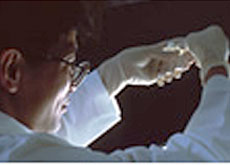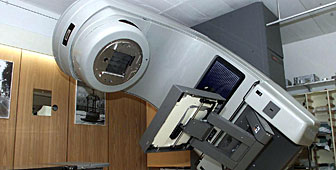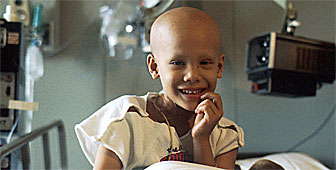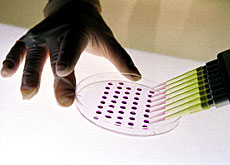Cancer conference highlights search for cure

Cancer experts from around the world are meeting in Lausanne to examine new ways of fighting the deadly disease, which kills an estimated 6.2 million people each year.
They are expected to focus on the latest developments in cancer detection and diagnosis, as well as advancements in treatment.
The symposium, which has been organised by the Swiss Institute for Experimental Cancer Research, will bring together more than 300 scientists and specialists from Europe and the United States.
Conference organiser Richard Iggo told swissinfo that the event, which is the fourth of its kind in Switzerland, provides European researchers with a rare opportunity to showcase their work, as well as exchange ideas with their American counterparts.
“There is a very strong trend for top meetings to take place in the United States, which forces Europeans to spend time and money going to the US,” he said.
“The Lausanne conference offers us a chance to invite the Americans to Switzerland and for European researchers to meet top US scientists.”
Alarming increase
According to the Geneva-based World Health Organization (WHO), cancer is becoming an “increasingly important health problem on every country’s health agenda”.
After heart disease, cancer is the second-biggest killer in the industrialised world.
Each year, around ten million new cases are diagnosed and over six million people die from the disease.
The WHO predicts that over the next two decades, the number of new cases will double to around 20 million per year.
This is due to the world’s growing elderly population, medicine’s improved ability to control communicable diseases and the rising incidence of certain forms of the disease, such as lung cancer, as a result of tobacco use.
New therapies
Although medical advances have resulted in around half of all cancers being successfully treated, Andreas Trumpp, one of the conference speakers, says better forms of treatment are still desperately needed.
“There hasn’t been much change in cancer deaths over the past ten years and the treatments we have now are not significantly different than they were a decade ago,” he said.
“So, there is certainly a lot of room for the development of new types of anti-cancer therapies.”
Trumpp also believes the time is ripe for the biotech and pharmaceutical industries to take clinical research a step further and speed up the discovery and development of new drugs.
Iggo agrees that more involvement on behalf of the “biopharma” companies would help solve another obstacle facing cancer specialists: lack of funding.
“The cost of doing the basic science is large, but it’s something that the Swiss National Science Foundation, for example, can fund,” he said.
“But the next step up involves an enormous amount of money… it costs hundreds of millions of dollars to come up with new drugs.”
Stem cells
Despite financial concerns and gloomy predictions that cancer cases and related deaths are on the rise, most experts remain optimistic that new forms of treatment can and will be developed.
Trumpp believes the recent discovery that there may be a direct link between embryonic development and cancer could lead to improved strategies for targeting tumour growth.
“The processes which lead to cancer formation are already active during embryonic development,” he explained.
“These similar genes are switched off in the adult body… but they are reactivated when a cancer forms, generating the kind of uncontrolled growth we see in tumours.”
According to Trumpp, a number of laboratories have also started examining whether stem cells are involved in the development of cancer.
“Certainly, with the evolving stem-cell field, there might be opportunities to look at totally new ways of fighting cancer.”
swissinfo, Anna Nelson in Geneva
Around ten million new cancer cases are diagnosed annually.
Experts predict the number of new cases will double to 20 million over next two decades.
More than six million people die of cancer each year.
The international conference, which runs until Saturday, is being hosted by Lausanne University Hospital.

In compliance with the JTI standards
More: SWI swissinfo.ch certified by the Journalism Trust Initiative



You can find an overview of ongoing debates with our journalists here. Please join us!
If you want to start a conversation about a topic raised in this article or want to report factual errors, email us at english@swissinfo.ch.